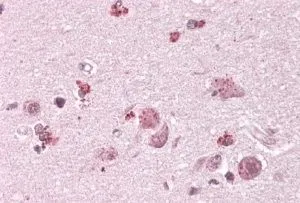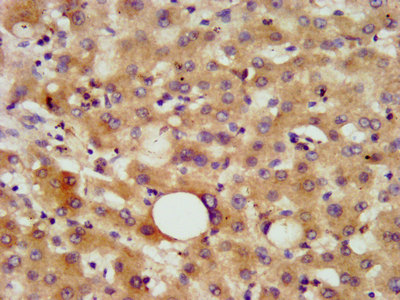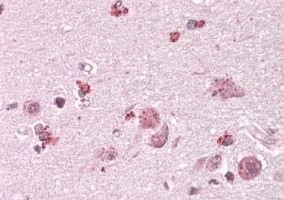
IHC-P analysis of human cortex using GTX88448 CHN2 antibody, C-term. Antigen retrieval : citrate buffer pH 6 Dilution : 3.8μg/ml
CHN2 antibody, C-term
GTX88448
ApplicationsImmunoHistoChemistry, ImmunoHistoChemistry Paraffin
Product group Antibodies
ReactivityHuman
TargetCHN2
Overview
- SupplierGeneTex
- Product NameCHN2 antibody, C-term
- Delivery Days Customer9
- Application Supplier NoteIHC-P: 3-6microg/ml. *Optimal dilutions/concentrations should be determined by the researcher.Not tested in other applications.
- ApplicationsImmunoHistoChemistry, ImmunoHistoChemistry Paraffin
- CertificationResearch Use Only
- ClonalityPolyclonal
- Concentration0.50 mg/ml
- ConjugateUnconjugated
- Gene ID1124
- Target nameCHN2
- Target descriptionchimerin 2
- Target synonymsARHGAP3, BCH, CHN2-3, RHOGAP3, beta-chimaerin, beta-chimerin, beta3-chimaerin, chimerin (chimaerin) 2, chimerin, beta-2, chimerin, testis-specific, rho-GTPase-activating protein 3
- HostGoat
- IsotypeIgG
- Protein IDP52757
- Protein NameBeta-chimaerin
- Scientific DescriptionThis gene encodes a guanosine triphosphate (GTP)-metabolizing protein that contains a phorbol-ester/diacylglycerol (DAG)-type zinc finger, a Rho-GAP domain, and an SH2 domain. The encoded protein translocates from the cytosol to the Golgi apparatus membrane upon binding by diacylglycerol (DAG). Activity of this protein is important in cell proliferation and migration, and expression changes in this gene have been detected in cancers. A mutation in this gene has also been associated with schizophrenia in men. Alternative transcript splicing and the use of alternative promoters results in multiple transcript variants. [provided by RefSeq, May 2014]
- ReactivityHuman
- Storage Instruction-20°C or -80°C,2°C to 8°C
- UNSPSC41116161






